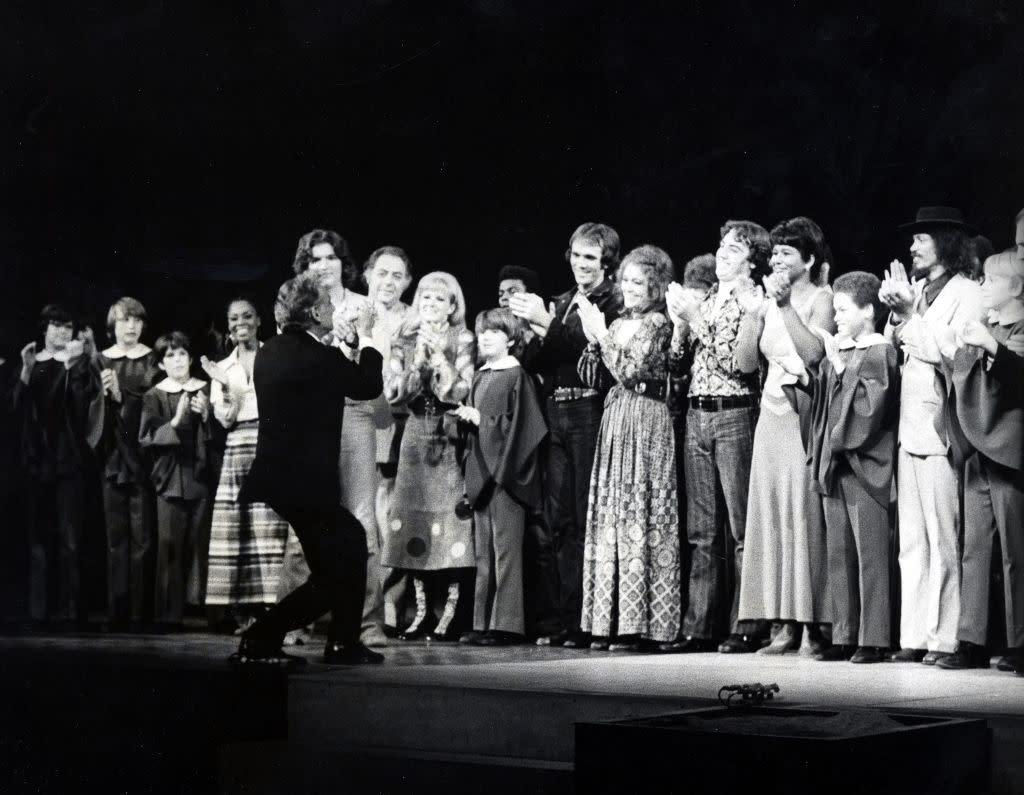8 of Leonard Bernstein's best works

- Oops!Something went wrong.Please try again later.
- Oops!Something went wrong.Please try again later.
'Maestro' is the movie — and man — on many people's lips, thanks to the awards buzz around Bradley Cooper's biopic of the legendary American composer and conductor Leonard Bernstein. The movie flicks at a variety of pieces from Bernstein's opus, in both background music and set pieces. But Bernstein deserves a long, luxurious dive.
'Mass: A Theatre Piece for Singers, Players and Dancers'
An FBI advisory, critical pannings, confused audiences: "Mass" had quite the debut when it inaugurated the Kennedy Center in Washington, D.C., in 1971. The work is indeed a hodgepodge, bridging as it does the religious and the secular. But for a piece that wrought such befuddlement, "Mass" has had a long life and many mountings across the globe. It clearly strikes a chord.
'On the Town'
A joyous paean to New York City, this rambunctious musical follows three sailors on leave as they seek the ladies of their dreams — or at least the right ladies for one night. "New York, New York" is a deservedly famous ode to the Big Apple, but the score is chockablock with lyrical dance sequences and even stop-the-show comedy numbers, like "I Can Cook Too."
'Symphony No. 3: Kaddish'
The last of Bernstein's three symphonies is an homage to the Kaddish, the Jewish prayer for the dead. It features a speaker, two choirs and a soprano soloist. The piece is dedicated to President John F. Kennedy, who was assassinated not long before the choral symphony debuted with the Israel Philharmonic in 1963. The piece toggles between complex choral structures, narration and "agonized, non-tonal music," explains the Bernstein trust. This is, after all, a symphony that grapples with existence. Tension is expected.
'West Side Story'
A (then) modern-day adaptation of "Romeo and Juliet" featuring rival gangs singing and dancing: Nothing about "West Side Story" should work. Yet the legendary musical's score swings and sings. The big romantic numbers get much of the adulation, as they should. What is astonishing is the way in which the wordless moments, like "The Dance at the Gym" and "The Rumble," capture teen energy and angst better than most journals and TikTok feeds.
'A Quiet Place'
Bernstein hoarded musical influences like a blue jay. As a result, his more wide-ranging, hybridized works were regularly criticized for trying to do all too much. Such was the case with his one full-length opera, "A Quiet Place," when it debuted in 1983 in Houston. The score is loaded with Mahler-style bombast, jazz licks and an ongoing flirtation with atonality. "A Quiet Place" didn't make its New York City debut until 2010. By then, admiration for Bernstein's eclecticism had bloomed.
'Candide'
The musical influences in Bernstein's adaptation of Voltaire's 18th-century satire range from the tango ("I Am So Easily Assimilated") to the Schottische ("Bon Voyage"). That breadth is a felicitous analog to the roaming comedy of the script. Bernstein's use of dissonance and nervy chordal progressions to convey longing and grief are especially powerful in numbers like "Candide's Lament."
'Wonderful Town'
There's a refreshing effervescence to the score for this tale of two sisters trying to build their careers as a writer and an actress. Bernstein is celebrated for his weightier works. Then you hear a lilting love song like "A Little Bit in Love," the tender homesickness of "Ohio" or the romping syncopation of "Swing!" from "Wonderful Town," and you can't help but fall for the light side of Lenny.
'Serenade After Plato's Symposium'
The central tenet of Plato's famed "Symposium" is love. Fitting, then, that Bernstein's musical adaptation of that text's dialogues is lush and plucky. The orchestrations are restrained: They feature a battery of strings, harp, percussion and a violin soloist. "Serenade" is one of Bernstein's lesser-known works; it soars.

